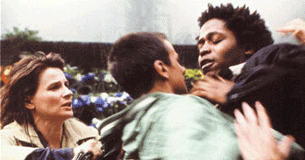Code: Unknown (Michael Haneke) 2001
 In a little over fifty, mostly single-shot, scenes Michael
Haneke’s Code: Unknown manages to establish a stunningly encompassing
treatise on the way that we either create or see a “false face” so that we
may avoid truly relating to others. The false face that is created might take
the form of exercising prejudice against others or by lessening one’s own
feelings toward another in order to avoid confrontation. That description may sound somewhat didactic, but the film
has an exceptional emotional immediacy that makes the turgid-sounding subject
matter exceptionally engaging. Few of the characters in the film actually talk
about the subject at hand, and the film lets their actions define their feelings
on such rarely talked about issues as racism, homelessness, and child abuse.
Time and again, Haneke presents a situation that provokes an audience reaction,
and then turns that reaction on its head as we gain more knowledge of the events
surrounding us. For example, near the beginning of the film, a young man is
accosted by an African immigrant after he casually tosses his litter into the
lap of a begging vagrant. The African’s violent response, though probably
“right”, feels far too extreme considering the crime. It’s only once we
come to understand his background, and the consistent brushing off that he gets
from society, that we can understand what provoked his response. This is the
film’s game at its simplest level, and it continues to branch out in scope and
complexity, following each character involved in this event, showing us their
family life and political viewpoints, with each scene forcing us to revaluate
our appraisal of them.
In a little over fifty, mostly single-shot, scenes Michael
Haneke’s Code: Unknown manages to establish a stunningly encompassing
treatise on the way that we either create or see a “false face” so that we
may avoid truly relating to others. The false face that is created might take
the form of exercising prejudice against others or by lessening one’s own
feelings toward another in order to avoid confrontation. That description may sound somewhat didactic, but the film
has an exceptional emotional immediacy that makes the turgid-sounding subject
matter exceptionally engaging. Few of the characters in the film actually talk
about the subject at hand, and the film lets their actions define their feelings
on such rarely talked about issues as racism, homelessness, and child abuse.
Time and again, Haneke presents a situation that provokes an audience reaction,
and then turns that reaction on its head as we gain more knowledge of the events
surrounding us. For example, near the beginning of the film, a young man is
accosted by an African immigrant after he casually tosses his litter into the
lap of a begging vagrant. The African’s violent response, though probably
“right”, feels far too extreme considering the crime. It’s only once we
come to understand his background, and the consistent brushing off that he gets
from society, that we can understand what provoked his response. This is the
film’s game at its simplest level, and it continues to branch out in scope and
complexity, following each character involved in this event, showing us their
family life and political viewpoints, with each scene forcing us to revaluate
our appraisal of them.
 Juliette Binoche plays Anne, a somewhat non-confrontational
actress, whose inner turmoil becomes the film’s center stage. The film is
subtitled with a header that claims it presents “Incomplete tales of several
journeys”, and although it does have a few straggling narrative ends, Anne’s
character arc is decidedly complete and immensely satisfying. Her initial
standoffishness is put to the test as her personal relationships, professional
life, and random encounters with strangers seem to conspire in an attempt to
harden her attitude toward the world. Binoche’s performance is stunning, and
her exceptional use of her body language and facial gestures makes Anne’s
every thought a physical reality. It’s probably the year’s best, period. At
a pivotal moment, after she has begun to realize that her façade of happiness
is somewhat transparent to her boyfriend, she is placed nervously alone and
unguarded on a stage, and asks the seemingly empty audience, “Is there anybody
out there?” Rare is the film that is so acutely aware of the lie of life that
an actor must create and the simultaneous vulnerability to and distance from the
world that that distance constructs. When Haneke shatters the fourth wall here,
as he famously did in his wonderful Funny Games, it is only to make us
more aware of the inability of a film to truly answer the questions that he is
posing.
Juliette Binoche plays Anne, a somewhat non-confrontational
actress, whose inner turmoil becomes the film’s center stage. The film is
subtitled with a header that claims it presents “Incomplete tales of several
journeys”, and although it does have a few straggling narrative ends, Anne’s
character arc is decidedly complete and immensely satisfying. Her initial
standoffishness is put to the test as her personal relationships, professional
life, and random encounters with strangers seem to conspire in an attempt to
harden her attitude toward the world. Binoche’s performance is stunning, and
her exceptional use of her body language and facial gestures makes Anne’s
every thought a physical reality. It’s probably the year’s best, period. At
a pivotal moment, after she has begun to realize that her façade of happiness
is somewhat transparent to her boyfriend, she is placed nervously alone and
unguarded on a stage, and asks the seemingly empty audience, “Is there anybody
out there?” Rare is the film that is so acutely aware of the lie of life that
an actor must create and the simultaneous vulnerability to and distance from the
world that that distance constructs. When Haneke shatters the fourth wall here,
as he famously did in his wonderful Funny Games, it is only to make us
more aware of the inability of a film to truly answer the questions that he is
posing.
 It’s to Haneke’s credit, then, that Code: Unknown
isn’t pompous enough to attempt to solve the issues that it raises. It’s not
so much a macro-political film as a micro-political one. It doesn’t proffer
solutions, but instead causes individual viewers to examine their own responses
and assumptions as they shift during the film’s running time. One could argue
that the film is cynical enough to endorse prejudice, but I would counter that
it is not endorsing the behavior in it so much as showing us how such bigotry is
cultivated. Haneke’s film disarms much possible criticism by refusing to slide
into preachy moralizing. Code: Unknown doesn’t create
narrow-mindedness, but instead, uses it as a topic to illustrate just how
brilliantly broad-minded filmmaking can be.
It’s to Haneke’s credit, then, that Code: Unknown
isn’t pompous enough to attempt to solve the issues that it raises. It’s not
so much a macro-political film as a micro-political one. It doesn’t proffer
solutions, but instead causes individual viewers to examine their own responses
and assumptions as they shift during the film’s running time. One could argue
that the film is cynical enough to endorse prejudice, but I would counter that
it is not endorsing the behavior in it so much as showing us how such bigotry is
cultivated. Haneke’s film disarms much possible criticism by refusing to slide
into preachy moralizing. Code: Unknown doesn’t create
narrow-mindedness, but instead, uses it as a topic to illustrate just how
brilliantly broad-minded filmmaking can be.
**** Masterpiece
12-01-01
Jeremy Heilman